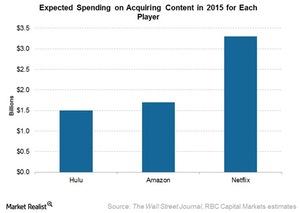Netflix Prefers Original Content over Content Licensing
Netflix holds the content licensing rights to its original content, but this original content is currently produced by outside studios like Disney’s ABC Studios.
Oct. 15 2015, Updated 12:05 p.m. ET

Netflix’s focus: Original content
Netflix (NFLX) expects to spend ~$5 billion on content acquisition in 2016. Currently, 10% of Netflix’s content spend is on original content. The company would like to raise that to 50% of its total content spend. Netflix believes original content will strengthen the company’s brand and drive up viewing hours.
The Wall Street Journal reported on August 30, 2015, that Netflix will not be renewing its deal with Epix, which ended in September. That means Netflix will not stream popular Epix movies like Transformers: Age of Extinction and Hunger Games: Catching Fire. MGM, Lions Gate Entertainment (LGF), and Viacom’s (VIA) Paramount Studios own Epix.
The reason Netflix is allowing the deal to lapse is the company’s increasing focus on original content. Original content is also the reason Netflix entered into a multi-year licensing agreement with The Walt Disney Company (DIS) to provide exclusive, original content.
According to a Wall Street Journal report citing estimates of RBC Capital Markets, Netflix could spend $3.3 billion this year on content acquisition. In comparison, Amazon (AMZN) and Hulu are expected to spend $1.7 billion and $1.5 billion, respectively, on the purchase of content in 2015, as you can see in the chart above.
Why focus on original content?
Netflix believes that original content targeted at various user groups will drive up viewing hours and make viewers watch shows repeatedly, turning them into potential subscriber events.
A September 25 Bloomberg Business report citing a person familiar with the matter said Netflix has leased 200,000 square feet of office and pre-production space in Hollywood and is planning to shoot comedian Chelsea Handler’s new talk show there.
This indicates that Netflix intends to produce more of these shows in the future. Currently, Netflix holds the content licensing rights to its original content, but this original content is produced by outside studios like Disney’s ABC Studios. Producing original content would give Netflix global distribution rights and could add to its revenues in the long term.
Content licensing is usually for a fixed number of years, and Netflix pays for an exclusive subscription video-on-demand, or SVOD, license for a given title. However, content providers may prefer other cable and broadcast networks and other over-the-top, or OTT, players over Netflix. Another possibility is that this content license may expire over a period. So to avoid a particular player’s monopoly over content, numerous licenses can be issued for the same content.
You can get a diversified exposure to Netflix by investing in the First Trust Dow Jones Internet ETF (FDN), which holds 5.3% of the stock.
